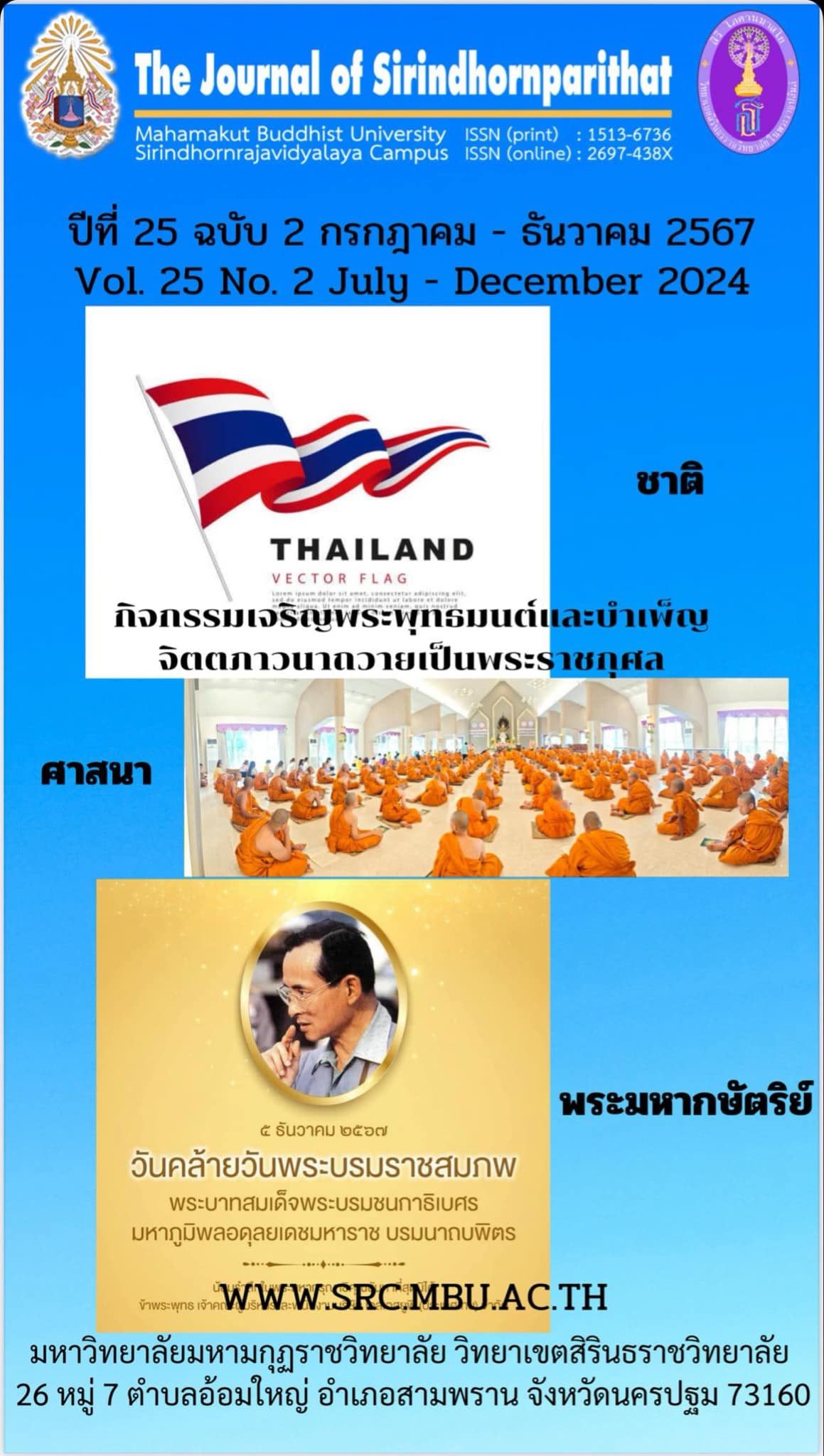The Guidelines for Developing Guidance Work Administration of Secondary Schools under the Lopburi Secondary School District Office
Keywords:
guideline, guidance work administration, secondary schoolAbstract
This research aims to 1) study guidance work administration of secondary schools under the Lopburi secondary school district office, and 2) purpose the guidelines for guidance work administration of secondary schools under the Lopburi secondary school district office. A total of 297 participants from 25 secondary schools were selected as the samples, including 25 school directors, 25 guidance teachers, and 175 supervisors. The research tool was a 5-point Likert rating scale questionnaire with the reliability of .98. The data were analyzed statistically through percentage, mean, and standard deviation. The results showed that 1) in general the guidance work administration of secondary schools under the Lopburi secondary school district office was at a good level. When considering each item in the questionnaire, it was found that the highest average was supervision and evaluation service followed by personnel management, and the lowest average was personal data management, 2) the guidelines for guidance work administration of secondary schools under the Lopburi secondary school district office include students’ behavior records. Specifically, schools need to form a committee of students’ behavior records, set up a meeting for school directors, guidance teachers, supervisors, staff, and parents, determine the topics used in the student’s behavior records, ensure understanding of student’s behavior records management, and apply data from student’s behavior records to support students’ academic, family, and other areas. In addition, schools should invite special speakers to share their expertise and knowledge with students about social and life skills, as well as those speakers from local organizations to present about how to take care of themselves physically and mentally and how to live and work collaboratively with others by setting up a committee to run a process. Schools should use technology for data management, for example using Google Form as a platform for students to choose topics and special speakers based on their interests. Also, satisfaction evaluations should be done after each event by using a Google Form. The evaluation results, then should be reported to school directors in order to improve the events in the next academic year. Furthermore, statistics should be used when students seek advice systematically. As a result, schools need to set up a committee to plan and run this process. Excel should be used for data record and analysis. The report should be done statistically using charts and percentages. Regarding career services, schools should be the mediators between employers and students. The committee should be formed in order to contact and work collaboratively with the government and private sectors, for instance, local hospitals, subdistrict administrative organization and the provincial employment office. Special speakers should also be invited to share knowledge. A satisfaction evaluation should be done after each event by using a Google Form. The evaluation results, then be reported to school directors in order to improve the events in the next academic year. Finally, regarding monitoring and earning money while studying, schools should contact and work collaboratively with the government and private sectors. Communication with those organizations should be done systematically in order to monitor and assist appropriately. In every academic year, each student’s personal data should be collected and recorded systematically and statistically.
References
เกศรา น้องคะนึง. (2560). การพัฒนาแนวทางการบริหารงานแนะแนวโรงเรียนในสังกัดสำนักงานเขตพื้นที่การศึกษามัธยมศึกษา เขต 20. วิทยานิพนธ์ปริญญาครุศาสตรมหาบัณฑิต สาขาวิชาการบริหารการศึกษา. มหาวิทยาลัยมหาสารคาม
คณิศร์ จับจิตต์. (2559). การศึกษาแนวทางการส่งเสริมงานแนะแนวในโรงเรียนขยายโอกาส ทางการศึกษา สังกัดสำนักงานเขตพื้นที่การศึกษาประถมศึกษาพระนครศรีอยุธยา เขต 1. วิทยานิพนธ์ปริญญาครุศาสตรมหาบัณฑิต สาขาวิชาการบริหารการศึกษา. มหาวิทยาลัยราชภัฏพระนครศรีอยุธยา
ณัฐกานต์ ภิญญะวัย. (2562). แนวทางส่งเสริมการมีส่วนร่วมในการดำเนินงานแนะแนวตามความต้องการของชุมชน สำหรับสถานศึกษาสังกัดสำนักงานเขตพื้นที่การศึกษาประถมศึกษาพระนครศรีอยุธยา เขต 2. วิทยานิพนธ์ปริญญาครุศาสตรมหาบัณฑิต สาขาวิชาการบริหารการศึกษา. มหาวิทยาลัยราชภัฏพระนครศรีอยุธยา
ชัชฏาภรณ์ ภูตันวงษ์. (2559). การดำเนินการจัดบริการแนะแนวในโรงเรียนตามทัศนะของผู้บริหารสถานศึกษาและครู สังกัดสำนักงานเขตพื้นที่การศึกษามัธยมศึกษา เขต 5
ธีราภรณ์ สุ่มมาตย์. (2559). ปัญหาและแนวทางพัฒนาการบริหารงานแนะแนวตามความคิดเห็นของผู้ปกครองนักเรียนชั้นมัธยมศึกษาตอนต้น ในโรงเรียนวัดตะพงนอก สังกัดสำนักงานเขตพื้นที่การศึกษาประถมศึกษาระยอง เขต 1
สำนักงานคณะกรรมการพัฒนาการเศรษฐกิจและสังคมแห่งชาติ. (2559). แผนพัฒนาเศรษฐกิจและสังคมแห่งชาติ (ฉบับที่12) พ.ศ.2560-2564
สำนักงานคณะกรรมการการศึกษาแห่งชาติ. (2553). พระราชบัญญัติการศึกษาแห่งชาติ พ.ศ.2542 และแก้ไขเพิ่มเติม พ.ศ. 2545 และฉบับที่ 3 พ.ศ. 2553 และฉบับที่ 4 พ.ศ. 2562
สำนักงานเขตพื้นที่การศึกษามัธยมศึกษาลพบุรี. (2565). .(ออนไลน์). แหล่งที่มา https:// https://www.sesalop.go.th/สืบค้นเมื่อ 29 ธันวาคม 2564.
Downloads
Published
Issue
Section
License
Copyright (c) 2024 Mahamakut Buddhist University

This work is licensed under a Creative Commons Attribution-NonCommercial-NoDerivatives 4.0 International License.
บทความที่ได้รับการตีพิมพ์เป็นลิขสิทธิ์ของ มหาวิทยาลัยมหามกุฏราชวิทยาลัย วิทยาเขตสิรินธรราชวิทยาลัย
ข้อความที่ปรากฏในบทความแต่ละเรื่องในวารสารวิชาการเล่มนี้เป็นความคิดเห็นส่วนตัวของผู้เขียนแต่ละท่านไม่เกี่ยวข้องกับหาวิทยาลัยมหามกุฏราชวิทยาลัย วิทยาเขตสิรินธรราชวิทยาลัย และคณาจารย์ท่านอื่นๆในมหาวิทยาลัยฯ แต่อย่างใด ความรับผิดชอบองค์ประกอบทั้งหมดของบทความแต่ละเรื่องเป็นของผู้เขียนแต่ละท่าน หากมีความผิดพลาดใดๆ ผู้เขียนแต่ละท่านจะรับผิดชอบบทความของตนเองแต่ผู้เดียว




